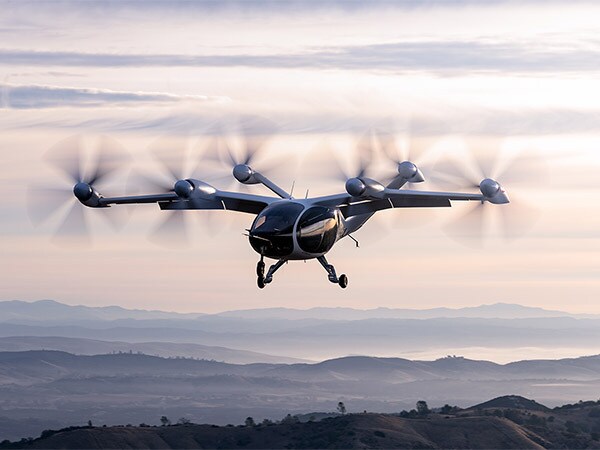Joby Aviation is the latest disruptive innovator to announce a SPAC deal, with the flying electric vehicles firm undergoing a reverse acquisition merger that will leave it valued at circa $6.6bn.
The company is already backed by Toyota [TYT.L] and Uber [UBER], and hopes to have its vehicles in commercial use by 2024.
Taking Joby Aviation public is Reinvent Technology Partners [RTP], a SPAC founded by LinkedIn co-founder Reid Hoffman and Zynga [ZNGA] founder Mark Pincus. Given the pedigree of its founders, Reinvent was able to raise $690m when it listed in 2020.
As part of the deal, Hoffman will take a seat on the Joby Aviation board.
“With valuable strategic partnerships including Toyota and Uber, a compelling business model and an unparalleled track-record of executing against its targets, we believe Joby is well-positioned to create a transformative new human-centered mobility network," Hoffman said in a press release accompanying the announcement.
“With valuable strategic partnerships including Toyota and Uber, a compelling business model and an unparalleled track-record of executing against its targets, we believe Joby is well-positioned to create a transformative new human-centered mobility network” - LinkedIn co-founder Reid Hoffman
What makes the SPAC interesting is that it could provide an early opportunity to invest in a company that could prove to become the Tesla [TSLA] of the skies.
What does Joby Aviation do?
Joby Aviation is developing electric vertical take-off and landing (eVTOL) aircraft to take commuting to the skies. Its flying taxis will allow a pilot to pick up four customers, with eVTOL tech having a 150-mile range. According to the company's website, flying with Joby will "feel more like getting into an SUV than boarding a plane."
The promise of an aerial ridesharing service is appealing, especially for anyone who has been stuck on the tube in rush hour, but there are challenges.
Vertical take-off and landing should give the eVOTLs flexibility as to where they can pick up and drop off users. In big cities, however, space is limited and helipads might not have the capacity to cope with extra traffic. Potentially suitable roofs could be used, but planning permission is unlikely to have factored in such a use just yet.
Drastically increased noise pollution is a potential concern, but these vehicles make around a quarter of the noise that helicopters produce, and could significantly reduce the amount of road traffic noise.
Joby is going public at an early stage in its development. According to the Financial Times, it has no real revenue of its own, although it hopes for Federal Aviation Administration certification in 2023, followed by commercial flights starting in 2024.
How big is the market?
Air mobility is still in its infancy as a market, however, in the next few decades, the skies above our heads could look very different.
According to a Deloitte report, the US Advanced Air Mobility (AAM) market will be up and running by 2025, pulling in a total revenue of $17bn.
Between 2025 and 2035, the US market is forecast to grow seven-fold, with a value of $115bn and a roughly even split between passenger and cargo revenue.
"Deloitte expects the AAM market for passenger and cargo mobility in the United States to reach approximately US$115 billion by 2035. This is equivalent to 30% of the US commercial aerospace market and 0.5% of the country’s GDP in 2019," wrote the Deloitte analysts.
“Deloitte expects the AAM market for passenger and cargo mobility in the United States to reach approximately US$115 billion by 2035. This is equivalent to 30% of the US commercial aerospace market and 0.5% of the country’s GDP in 2019” - Deloitte analysts
Where next?
The Deloitte analysts noted that 200 companies are already developing EVO aircraft, with $2bn spent on development as of September 2020. China is already putting in place the needed regulatory approvals to support AAM, while progress is also being made in Germany and South Korea.
For any new technology to be adopted, it needs to prove it is efficient, useful and safe. It also needs to prove it is good value. Initially, taking a ride on an eVTOL might be the reserve of the affluent, or saved as a gimmick, but should the technology become more affordable — and practical — then the same investment frenzy that took hold of the electric car market last year could happen repeat with the nascent air mobility sector.
Disclaimer Past performance is not a reliable indicator of future results.
CMC Markets is an execution-only service provider. The material (whether or not it states any opinions) is for general information purposes only, and does not take into account your personal circumstances or objectives. Nothing in this material is (or should be considered to be) financial, investment or other advice on which reliance should be placed. No opinion given in the material constitutes a recommendation by CMC Markets or the author that any particular investment, security, transaction or investment strategy is suitable for any specific person.
The material has not been prepared in accordance with legal requirements designed to promote the independence of investment research. Although we are not specifically prevented from dealing before providing this material, we do not seek to take advantage of the material prior to its dissemination.
CMC Markets does not endorse or offer opinion on the trading strategies used by the author. Their trading strategies do not guarantee any return and CMC Markets shall not be held responsible for any loss that you may incur, either directly or indirectly, arising from any investment based on any information contained herein.
*Tax treatment depends on individual circumstances and can change or may differ in a jurisdiction other than the UK.
Continue reading for FREE
- Includes free newsletter updates, unsubscribe anytime. Privacy policy





